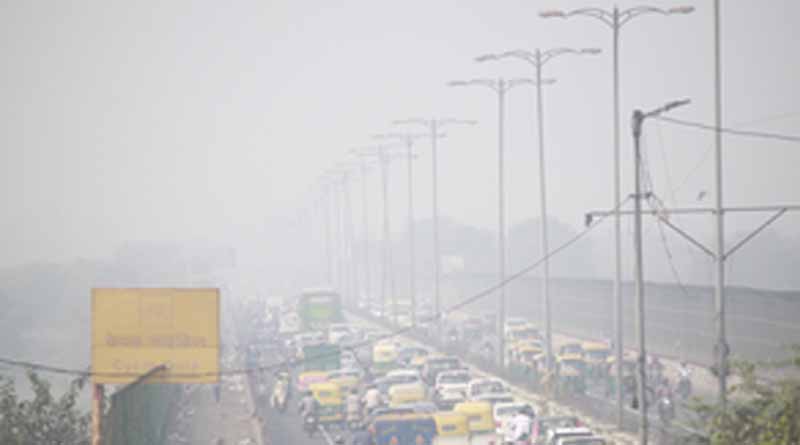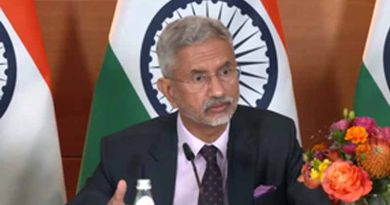CAQM invokes GRAP Stage-IV in Delhi-NCR as AQI reaches ‘severe plus’ category
New Delhi, Nov 17 : The Commission for Air Quality Management (CAQM) on Sunday invoked all actions as envisaged under Stage-IV of the Graded Response Action Plan (‘Severe+’Air Quality) in Delhi-NCR from Monday amid worsening air.
The decision came after the Sub-Committee for operationalisation of the GRAP called an emergency meeting in view of the rising pollution owing to unfavourable meteorological conditions in Delhi-NCR.
On Sunday, Delhi’s daily average Air Quality Index clocked 441 at 4 p.m., as per the Daily AQI Bulletin by the Central Pollution Control Board (CPCB), and further rose to 457 at 7 p.m.
The Sub-Committee while comprehensively reviewing the overall air quality scenario in the region as well as the forecasts for meteorological conditions and air quality index made available by IMD/IITM during the meeting observed that the average AQI for Delhi at 4 p.m. on Sunday was recorded as 441 which started to steadily rise further. At 6 p.m., the average AQI for Delhi clocked 452, which had escalated to 457 at 7 p.m. due to the continuing unfavourable meteorological and climatic conditions.
Keeping in view the prevailing trend of deteriorating air quality of NCR and in an effort to prevent further deterioration of air quality in the region, the Sub-Committee took the call to invoke all actions as envisaged under Stage-IV of GRAP — ‘Severe+’ Air Quality (Delhi’s AQI > 450), with effect from 8 a.m. of November 18 (tomorrow) in the entire NCR.
This is in addition to the preventive/restrictive actions mentioned under Stage I, Stage II and Stage III of GRAP already in force. Various agencies responsible for implementing measures under GRAP and Pollution Control Boards (PCBs) of NCR and DPCC have also been advised to ensure strict implementation of actions under Stage-IV of revised GRAP in addition to all actions under Stage-I, Stage-II Stage-III of GRAP already in force, during this period.
An 8-point action plan as per Stage-IV of GRAP is applicable with immediate effect from 8 a.m. of November 18 (tomorrow) in the entire NCR. This 8-point action plan includes steps to be implemented/ ensured by different agencies and Pollution Control Boards of NCR and DPCC.
These steps are:
Stopping entry of truck traffic into Delhi (except for trucks carrying essential commodities/providing essential services). All LNG/CNG /Electric/BS-VI Diesel trucks shall however be permitted to enter Delhi.
Not permitting LCVs registered outside Delhi, other than EVs/CNG/BS-VI diesel, to enter Delhi, except those carrying essential commodities/ providing essential services.
Enforcing a strict ban on the plying of registered BS-IV and below diesel-operated Medium Goods Vehicles (MGVs) and Heavy Goods Vehicles (HGVs) in Delhi, except those carrying essential commodities/providing essential services.
Banning C&D activities, as in the GRAP Stage‑III, also for linear public projects such as highways, roads, flyovers, overbridges, power transmission, pipelines, telecommunication etc.
NCR state governments and GNCTD may take a decision on discontinuing physical classes even for Classes 6 to 9, and Class 11 and conduct lessons in an online mode.
NCR state governments/GNCTD to take a decision on allowing public, municipal and private offices to work on 50 per cent strength and the rest to work from home.
The Central Government may take appropriate decisions on permitting work from home for employees in its offices.
State governments may consider additional emergency measures like the closure of colleges/educational institutions and closure of non‑emergency commercial activities, permitting running of vehicles on odd-even basis of registration numbers etc.
Further, CAQM appeals to the citizens of NCR to adhere to the Citizen Charter under GRAP and assist in the effective implementation of the GRAP measures aimed towards sustaining and improving the air quality in the region, in addition to the Citizen Charter of Stage-I, Stage-II and Stage-III.
Children, the elderly and those with respiratory, cardiovascular, cerebrovascular or other chronic diseases are advised to avoid outdoor activities and stay indoors, as much as possible.









